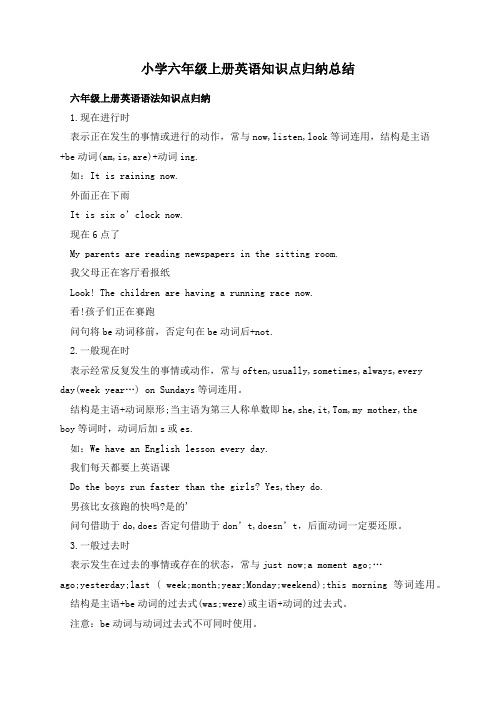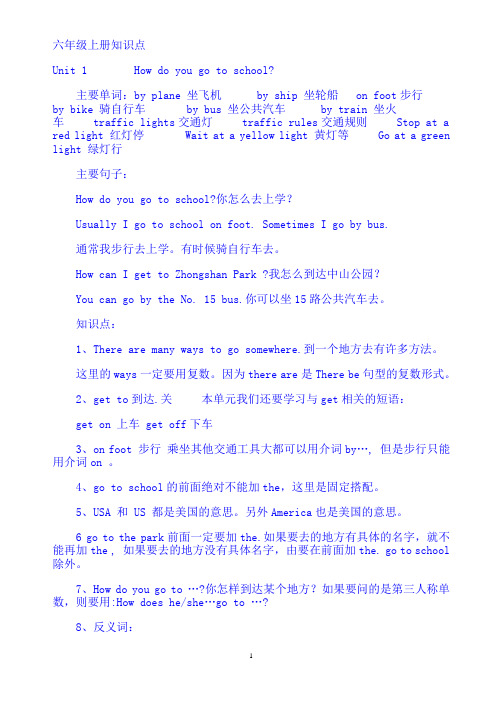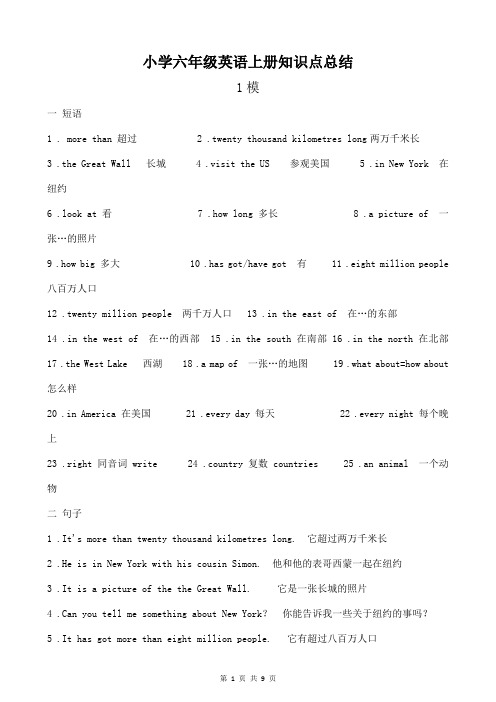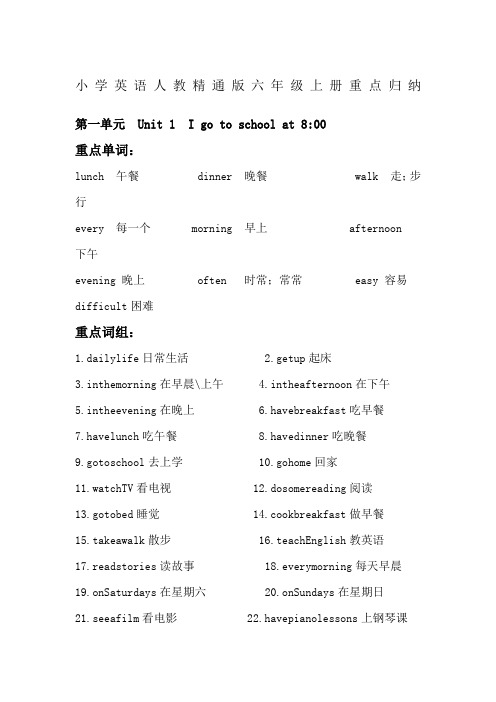小学英语六年级上册
人教版小学英语六年级上册·单词表

人教版小学英语六年级上册·单词表一、基础词汇1. family (家庭)2. parent (父母)3. brother (兄弟)4. sister (姐妹)5. uncle (叔叔)6. aunt (阿姨)7. cousin (堂兄弟姐妹)8. friend (朋友)9. classmate (同学)10. teacher (老师)二、日常用语1. good morning (早上好)2. good afternoon (下午好)3. good evening (晚上好)5. goode (再见)6. please (请)7. thank you (谢谢)8. sorry (对不起)9. excuse me (打扰一下)10. yes (是的)11. no (不是)三、学习用品1. book (书)2. pen (钢笔)3. pencil (铅笔)4. ruler (尺子)5. eraser (橡皮)6. crayon (蜡笔)7. scissors (剪刀)8. glue (胶水)9. notebook (笔记本)10. schoolbag (书包)四、时间与日期1. day (天)2. week (周)3. month (月)4. year (年)5. hour (小时)6. minute (分钟)7. second (秒)8. Monday (星期一)9. Tuesday (星期二)10. Wednesday (星期三)11. Thursday (星期四)12. Friday (星期五)13. Saturday (星期六)14. Sunday (星期日)五、天气与季节1. sunny (晴朗的)2. cloudy (多云的)3. rainy (下雨的)4. snowy (下雪的)5. hot (热的)6. warm (温暖的)7. cool (凉爽的)8. cold (寒冷的)9. spring (春天)10. summer (夏天)11. autumn (秋天)12. winter (冬天)六、食物与饮料1. rice (米饭)2. bread (面包)3. cake (蛋糕)4. egg (鸡蛋)5. milk (牛奶)6. water (水)7. juice (果汁)8. tea (茶)9. coffee (咖啡)10. fruit (水果)七、地点与方向1. home (家)2. school (学校)3. park (公园)4. hospital (医院)5. post office (邮局)6. supermarket (超市)7. library (图书馆)8. restaurant (餐厅)9. left (左边)10. right (右边)11. front (前面)12. back (后面)13. up (上面)14. down (下面)八、身体部位与健康状况1. head (头)2. face (脸)3. eye (眼睛)4. ear (耳朵)5. nose (鼻子)6. mouth (嘴巴)7. arm (手臂)8. leg (腿)9. foot (脚)10. hand (手)11. finger (手指)12. tooth (牙齿)13. healthy (健康的)14. sick (生病的)15. hurt (受伤的)九、衣物与颜色1. shirt (衬衫)2. pants (裤子)3. dress (裙子)4. skirt (短裙)5. shoes (鞋子)6. socks (袜子)7. hat (帽子)8. coat (外套)9. sweater (毛衣)10. red (红色)11. blue (蓝色)12. green (绿色)13. yellow (黄色)14. orange (橙色)15. purple (紫色)十、动植物与自然1. animal (动物)2. cat (猫)3. dog (狗)4. fish (鱼)5. bird (鸟)6. tree (树)7. flower (花)8. grass (草)9. sky (天空)10. cloud (云)11. sun (太阳)12. moon (月亮)13. star (星星)14. mountain (山)15. river (河流)十一、兴趣爱好与活动1. read (阅读)2. write (写作)3. listen (听)4. speak (说)5. draw (画画)6. sing (唱歌)7. dance (跳舞)8. play (玩耍)9. swim (游泳)10. run (跑步)11. jump (跳)12. ride (骑)13. watch (观看)14. cook (做饭)15. learn (学习)十二、交通工具与旅行1. car (汽车)2. bus (公交车)3. train (火车)4. plane (飞机)5. bicycle (自行车)6. boat (船)7. ship (轮船)8. subway (地铁)9. road (道路)10. bridge (桥梁)11. station (车站)12. airport (机场)13. trip (旅行)14. vacation (假期)15. journey (旅程)十三、情感与感受1. happy (快乐的)2. sad (悲伤的)3. angry (生气的)4. excited (兴奋的)5. surprised (惊讶的)6. scared (害怕的)7. tired (累的)8. bored (无聊的)9. worried (担心的)11. interested (感兴趣的)12. proud (骄傲的)13. jealous (嫉妒的)14. lonely (孤独的)15. grateful (感激的)十四、数字与计算1. one (一)2. two (二)3. three (三)4. four (四)5. five (五)6. six (六)7. seven (七)9. nine (九)10. ten (十)11. hundred (一百)12. thousand (一千)13. million (一百万)14. add (加)15. subtract (减)16. multiply (乘)17. divide (除)18. equal (等于)19. more (更多)20. less (更少)十五、日常生活与习惯1. wake up (醒来)2. get up (起床)3. brush teeth (刷牙)4. take a shower (洗澡)5. have breakfast (吃早餐)6. go to school (去上学)7. do homework (做作业)8. watch TV (看电视)9. go to bed (睡觉)10. sleep (睡觉)12. drink (喝)13. cook (做饭)14. clean (打扫)15. wash (洗)十六、节日与庆祝1. New Year's Day (新年)2. Spring Festival (春节)3. Easter (复活节)4. Labor Day (劳动节)5. Dragon Boat Festival (端午节)6. MidAutumn Festival (中秋节)7. National Day (国庆节)8. Christmas Day (圣诞节)9. birthday (生日)10. party (派对)11. celebrate (庆祝)12. gift (礼物)13. card (卡片)14. candle (蜡烛)15. cake (蛋糕)。
小学英语 六年级上册(三年级起点) 英语单词表(附音标,中英分开)word打印版

play tennis
boat[bəʊt]
go boating[ɡəu ˈbəʊtɪŋ]
go skating[ɡəu ˈskeɪtɪŋ]
go shopping[ɡəu ˈʃɔpɪŋ]
a lot of[ə lɔt ɔv]
how often[hau ˈɔfən]
twice[twaɪs]
once[wʌns]
study[ˈstʌdi]
do well in[du: wel in]
Unit 3 Care for the earth
care for[kɛə fɔ:]
earth[ɜ:θ]
pick[pɪk]
pick flowers
cut down[kʌt daun]
dirty[ˈdɜ:ti]
make the air dirty
waste[weɪst]
drive[draɪv]
drive a car[draiv ə kɑ:]
more[mɔ:(r)]
have to[ˈhæv tə]
World Car Free Day
something[ˈsʌmθɪŋ]
think[θɪŋk]
also[ˈɔ:lsəʊ]
thing[θɪŋ]
only[ˈəʊnli]
play beach volleyball
museum[mjuˈzi:əm]
visit the museum
buy some gifts
sea food[si: fu:d]
eat sea food
make a cake[meik ə keik]
myself[maɪˈself]
cousin[ˈkʌzn]
小学六年级上册英语知识点归纳总结

小学六年级上册英语知识点归纳总结六年级上册英语语法知识点归纳1.现在进行时表示正在发生的事情或进行的动作,常与now,listen,look等词连用,结构是主语+be动词(am,is,are)+动词ing.如:It is raining now.外面正在下雨It is six o’clock now.现在6点了My parents are reading newspapers in the sitting room.我父母正在客厅看报纸Look! The children are having a running race now.看!孩子们正在赛跑问句将be动词移前,否定句在be动词后+not.2.一般现在时表示经常反复发生的事情或动作,常与often,usually,sometimes,always,every day(week year…) on Sundays等词连用。
结构是主语+动词原形;当主语为第三人称单数即he,she,it,Tom,my mother,theboy等词时,动词后加s或es.如:We have an English lesson every day.我们每天都要上英语课Do the boys run faster than the girls? Yes,they do.男孩比女孩跑的快吗?是的'问句借助于do,does否定句借助于don’t,doesn’t,后面动词一定要还原。
3.一般过去时表示发生在过去的事情或存在的状态,常与just now;a moment ago;…ago;yesterday;last ( week;month;year;Monday;weekend);this morning等词连用。
结构是主语+be动词的过去式(was;were)或主语+动词的过去式。
注意:be动词与动词过去式不可同时使用。
如:My earphones were on the ground just now.我的耳机刚刚还在呢。
新pep小学英语六年级上册教案5篇

新pep小学英语六年级上册教案5篇新pep小学英语六年级上册教案5篇教案中对每个课题或每个课时的教学内容,教学步骤的安排,教学方法的选择,板书设计,教具或现代化教学手段的应用,下面小编给大家带来关于新pep 小学英语六年级上册教案,方便大家学习新pep小学英语六年级上册教案1教学目标知识目标:能够进行物品归属的问话与答语,并能根据物体的远近,正确使用this和that。
能力目标:能听懂,会说要求的单词和句子情感价值:进一步提高对英语学习的热情,培养更加稳定的学习兴趣。
能积极主动地参与课堂活动,在情景对话中大胆开口,主动模仿。
教学重点学习和练习正确书写四会单词和四会句子.教学难点正确使用代词this和that。
课时数 2教学过程 1.热身 / 复习(Warming-up / Revision)1)播放课本附录中的歌曲I want to be your friend, 渲染课堂气氛。
2)把小动物面具挂在墙上,让学生说出它们是什么动词,是谁的。
2.新课导入(Presentation)1)展示本课教学挂图,让学生观察,并提出问题:What are Peter and Lisa doing?What are they talking about?2)播放本课录音,让学生听,然后讨论自己的猜测是否正确。
3)再放录音,让学生仔细听:谁扮演bear?谁的头饰找不到了?最后找到了吗?4)指导学生跟读录音。
5)让学生四人一组分角色表演会话。
6)鼓励学生戴面具到讲台上来表演。
3.趣味操练(Practice)1)教师将全班划分成6~8个小组,每组发一张白纸,每张白纸的最上面都写有“失物招领处”。
要求每组画出3~4种物品,供其它组认领。
2)每组分成两部分,一部分当失主去其它组找丢失物品,另一部分留在本组提供物品。
用所学句型进行交际活动。
3)播放本课投影片,让学生边看边配音。
4. 拓展活动(Additional activities)1)回家听本课录音,模仿语音语调。
PEP人教版小学六年级英语上册知识点

六年级上册知识点Unit 1 How do you go to school?主要单词:by plane 坐飞机 by ship 坐轮船 on foot步行by bike 骑自行车 by bus 坐公共汽车 by train 坐火车 traffic lights交通灯 traffic rules交通规则 Stop at a red light 红灯停 Wait at a yellow light 黄灯等 Go at a green light 绿灯行主要句子:How do you go to school?你怎么去上学?Usually I go to school on foot. Sometimes I go by bus.通常我步行去上学。
有时候骑自行车去。
How can I get to Zhongshan Park ?我怎么到达中山公园?You can go by the No. 15 bus.你可以坐15路公共汽车去。
知识点:1、There are many ways to go somewhere.到一个地方去有许多方法。
这里的ways一定要用复数。
因为there are是There be句型的复数形式。
2、get to到达.关本单元我们还要学习与get相关的短语:get on 上车 get off下车3、on foot 步行乘坐其他交通工具大都可以用介词by…, 但是步行只能用介词on 。
4、go to school的前面绝对不能加the,这里是固定搭配。
5、USA 和 US 都是美国的意思。
另外America也是美国的意思。
6 go to the park前面一定要加the.如果要去的地方有具体的名字,就不能再加the , 如果要去的地方没有具体名字,由要在前面加the. go to school 除外。
7、How do you go to …?你怎样到达某个地方?如果要问的是第三人称单数,则要用:How does he/she…go to …?8、反义词:get on(上车)---get off(下车) near(近的)—far(远的) fast(快的)—slow(慢的) because(因为)—why(为什么)same(相同的)—different(不同的)9、近义词:see you---goodbye sure---certainly---of course10、频度副词:always 总是,一直 usually 通常 often经常 sometimes 有时候 never 从来不Unit 2 Where is the science museum?主要单词:library 图书馆 post office 邮局 hospital医院 cinema 电影院 bookstore书店 science museum科学博物馆 turn left向左转 turn right 向右转 go straight 直行 north北 south南 east东 west西主要句子:Where is the cinema, please? 请问电影院在哪里?It’s next to the hospital. 它与医院相邻。
小学六年级英语上册知识点总结

小学六年级英语上册知识点总结1模一短语1 . more than 超过2 .twenty thousand kilometres long两万千米长3 .the Great Wall 长城4 .visit the US 参观美国5 .in New York 在纽约6 .look at 看7 .how long 多长8 .a picture of 一张…的照片9 .how big 多大 10 .has got/have got 有 11 .eight million people 八百万人口12 .twenty million people 两千万人口 13 .in the east of 在…的东部14 .in the west of 在…的西部 15 .in the south 在南部16 .in the north 在北部17 .the West Lake 西湖 18 .a map of 一张…的地图 19 .what about=how about 怎么样20 .in America 在美国 21 .every day 每天 22 .every night 每个晚上23 .right 同音词 write 24 .country 复数 countries 25 .an animal 一个动物二句子1 .It's more than twenty thousand kilometres long. 它超过两万千米长2 .He is in New York with his cousin Simon. 他和他的表哥西蒙一起在纽约3 .It is a picture of the the Great Wall. 它是一张长城的照片4 .Can you tell me something about New York?你能告诉我一些关于纽约的事吗?5 .It has got more than eight million people. 它有超过八百万人口6 .Beijing has got about twenty million people. 北京大约有两千万人口7 .It is in the west. 它是在西部8 .It's in the east of China. 它是在中国的东部9 .What a big map of the US!多么大的一张美国地图啊!2 模一短语1 .Chinese dancing 中国的舞蹈2 .any 用于否定句或一般疑问句中3 .in China 在中国4 .send an email 发送一封电子邮件5 .send sb sth=send sth to sb 给某人发送或邮寄某物6 .want sth 想要某物7 .want to do sth 想要做某事 8 .let's=let us 后加动词原形让我们9 .there 对应词 here 10 .the Changjiang River 长江11 .the Huangshan Mountain 黄山 12 .in the street 在大街上二句子1 .There is Chinese dancing. 有中国的舞蹈2 .There's a Chinatown in New York. 在纽约有一个唐人街3 .I'm sending an email to my family in China.我正在给我在中国的家人发送一个电子邮件4 .Do you want to go to Chinatown?你想要去唐人街吗?5 .Let's go to Chinatown. 让我们去唐人街吧6 .There are lots of beautiful lakes in China. 在中国有许多漂亮的湖7 .This is the famous Changjiang River. 这是著名的长江3模一词组1 .collect stamps 收集邮票2 .all of these stamps 所有的这些邮票3 .another Chinese stamp 另一张中国邮票4 .collect dolls 收集玩具娃娃6 .picture books 图画书7 .fly a kite=fly kites 放风筝8 .Chinese kites 中国的风筝9 .dragon kites 龙风筝 10 .ride a bike=ride bikes 骑自行车11 .play a game= play games 玩游戏 12 .collect toy cars 收集玩具汽车二句子1 .Collecting stamps is my hobby. 收集邮票是我的业余爱好2 .These are stamps from Canada. 这些是来自于加拿大的邮票3 .Have you got any stamps from China?你有一些来自于中国的邮票吗?4 .These stamps are from my letter. 这些邮票是来自于我的信5 .Is there a letter for me?有一封给我的信吗?6 .What's your hobby?你的爱好是什么?7 .Flying kites is my hobby. 放风筝是我的爱好8 .Taking pictures is my hobby. 拍照是我的爱好9 .Do you collect stamps?你收集邮票吗?4模一短语1 .my favourite festival 我最喜欢的节日2 .on Thanksgiving Day 在感恩节3 .on Flag Day 在国旗制定纪念日4 .fly the flag 升国旗5 .sing songs 唱国歌6 . after Thanksgiving dinner 感恩晚餐之后7 .American festival 美国的节目8 .have a special meal 吃一顿特殊的饭9 .on TV 在电视上10 .the Spring Festival 春节 11.eat moon cakes 吃月饼12 .at the Mid-Autumn Festival 在中秋节 13 .at the Dragon Boat Festival 在端午节14 .see the dragon boat race 看龙舟比赛 15 .hang lanterns 挂灯笼16 .do dragon dances 舞龙 17 .hang 过去式 hung二句子1 .Thanksgiving is my favourite festival. 感恩节是我最喜欢的节日2 .On Thanksgiving Day we say “thank you”for our food ,family and friend.在感恩节,我们对我们的食物,家人,朋友说谢谢你。
小学六年级英语 上册 下册单词汇总表

128 bigger
a. 更大的
129 excited
a. 兴奋的
130 bullet
n. 子弹
131 lazy
a. 懒惰的
132 roof
n. 屋顶
133 yard
n. 院子
134 hit
v. 碰撞
135 see the world
见世面
136 one by one
一个接一个
137 look out of
建筑物;楼房
99 sushi n.
寿司(日本食物)
100 in the north of 在……北部
101 in the eastof 在……东部
102 air
n. 空气
103 everywhereadv./n.处处;到处
104 alive adj. 活着的
105 balloon n.
气球
106 factory n.
46 rhino n.
犀牛
47 learn v.
学会;学习
48 send
v.
安排去;寄;送
49 in danger
面临危险
50 in the past
在过去
51 take care of
照顾;照料
52 go for a walk 去散步
53 drive away
赶走
54 e-friend n.
网友
55 country n.
28 in a short time 很快
29 carry
v. 背,提,拿
30 onliher
校长
32 PS
n. 附言
33 mountain n. 山,山脉
小学英语人教精通版六年级上册重点归纳

小学英语人教精通版六年级上册重点归纳第一单元 Unit 1 I go to school at 8:00重点单词:lunch 午餐 dinner 晚餐 walk 走;步行every 每一个 morning 早上 afternoon 下午evening 晚上 often 时常;常常 easy 容易difficult困难重点词组:1.dailylife日常生活2.getup起床3.inthemorning在早晨\上午4.intheafternoon在下午5.intheevening在晚上6.havebreakfast吃早餐7.havelunch吃午餐 8.havedinner吃晚餐9.gotoschool去上学 10.gohome回家11.watchTV看电视 12.dosomereading阅读13.gotobed睡觉 14.cookbreakfast做早餐15.takeawalk散步 16.teachEnglish教英语17.readstories读故事 18.everymorning每天早晨19.onSaturdays在星期六 20.onSundays在星期日21.seeafilm看电影 22.havepianolessons上钢琴课23.playthepiano弹钢琴 24.athome在家25.helpsb.todothehousework帮助某人做家务26.cleanthedoor擦门 27.cleanthewindow擦窗户28.cleanthefloor擦地板重点句型:1.Idon’thavebreakfastat7:00inthemorning.我不是在早上七点钟吃早餐;2.Shegetsupat6:00inthemorning.她在早上六点钟起床;3.Shedoesn’tgetupat6:30inthemorning.她不是在早上6:30起床;4.WhatdoesKatedoonSaturdays凯特在周六做什么5.Sheusuallyplaysthepiano.她通常弹钢琴;6.Ihavebreakfastat7:30.我在7:30吃早饭;7.Ihavelunchat12:00.我在12:00吃午饭;8.Ihavedinnerat6:00.我在6:00吃晚餐;9.WhatdoyoudoonSaturdays你在周六干什么10.Ioftengoandseeafilm.我经常去看电影;第二单元 Unit 2 What's your hobby重点单词:open开;打开 hobby爱好 collect收集map地图 box盒子 colour颜色dad爸爸 mum妈妈 plant 植物;种植flower 花 drink喝 tea茶take 拿;取 photo照片 kid小孩baby婴儿 hungry饿的 cry哭重点词组:1.anewtoycar一辆新的玩具汽车2.havealook看一看3.collecttoycars收集玩具汽车4.collectstamps收集邮票5.collectmaps收集地图6.collectpicturecards收集卡片7.lookat看 8.plantflowers种花9.drinkChinesetea喝中国茶 10.gofishing去钓鱼11.cookmeals做饭12.beinterestedin…对……感兴趣13.makedolls做布娃娃 14.playcomputergames玩电脑游戏15.takephotos照相 16.takegoodcareof照顾好17.talkabout谈论 18.playbasketball打篮球19.lookfor寻找20.from…to…从……到……21.atnight在夜间重点句型:1.What’syourgrandpa’shobby你爷爷的爱好是什么2.Hishobbyisfishing.他的爱好是钓鱼;3.Whatareyouinterestedin你对什么感兴趣4.I’minterestedintakingphotos.我对拍照感兴趣;5.What’syourhobby你的爱好是什么6.Myhobbyiscollectingmaps.我的爱好是收集地图;6.What’syourdad’shobby你爸爸的爱好是什么7.Hishobbyisplantingflowers.他的爱好是种花;第三单元 Unit 3 Would you like to come to my birthday party重点单词:jelly果冻 time时间 after 在……后then那时 me 我I的宾格 bye再见kind种类 candy糖果 light点燃ice cream冰激凌 sure当然重点词组:1.birthdayparty生日聚会2.afterschool放学后3.invitationcard邀请卡4.inviteyourfriendstoyourparty邀请朋友参加聚会5.celebrateyourbirthdaywithyourfriends与朋友庆祝生日6.giveabirthdaycardtoyourfriend向朋友赠送生日贺卡7.star-shapedcake星形蛋糕 8.heart-shapedcake心形蛋糕9.fruitpie水果派\水果馅饼 10.lightthecandles点蜡烛11.singthebirthdaysong唱生日歌 12.makeawish许愿13.blowoutthecandles吹蜡烛 14.cutthecake切蛋糕15.eatthecake吃蛋糕 16.apieceofcake一块蛋糕重点句型:1.Whatkindofcakewouldyoulike你想要什么种类的蛋糕2.I’dlikeaheart-shapedcake.我想要一个心形的蛋糕;3.Howdotheycelebratethebirthday他们怎么庆祝生日的4.First,theylightthecandlesandthen首先,他们点燃蜡烛,然后……5.Wouldyouliketocometomybirthdayparty你愿意来我的生日晚会吗6.Sure.I’dloveto. 当然,我愿意;7.Goodbye/Bye-bye/Bye 再见;8.CanIhavesomeicecream我能吃些冰激凌吗9.Here’sabirthdaycakeforyou.这个生日蛋糕是送给你的;10.inviteyourfriendstoyourparty邀请你的朋友到你的晚会11.celebrateyourbirthdaywithyourfriends和你的朋友一起庆祝你的生日12.giveabirthdaycardtoyourfriend把这个生日卡片给你朋友第四单元 Unit 4 January is the first month重点单词:Easter复活节 January一月February二月Back回原处;后面 their他她、它们的 March三月April 四月 tree 树;树木grass草;草地Stop使停止 egg蛋;卵 May五月June 六月重点词组:1.thefirstmonthoftheyear一年里的第一个月2.thesecondmonthoftheyear一年里的第二个月3.NewYear’sDay新年4.SpringFestival春节5.TreePlantingDay植树节borDay\MayDay劳动节7.Mother’sDay母亲节8.Children’sDay儿童节9.Father’sDay父亲节 10.planttrees植树11.thethirdmonthoftheyear一年里的第三个月12.thefourthmonthoftheyear一年里的第四个月13.thefifthmonthoftheyear一年里的第五个月14.thesixthmonthoftheyear一年里的第六个月15.gobackhome回家 16.inthesouthofChina在中国南方17.alltheday一整天 18.inMarch在三月19.takeaphoto照相 20.goonatrip旅行重点句型:1.Januaryisthefirstmonthoftheyear.一月份是一年中的第一个月;2.Februaryisthesecondmonthoftheyear.二月份是一年中的第二个月;3.Marchisthethirdmonthoftheyear.三月份是一年中的第三个月;4.Aprilisthefourthmonthoftheyear.四月份是一年中的第四个月;5.Mayisthefifthmonthoftheyear.五月份是一年中的第五个月;6.Juneisthesixthmonthoftheyear.六月份是一年中的第六个月;第五单元 Unit 5 July is the seventh month重点单词:Christmas圣诞节 July七月 August八月Month月 year 年 September 九月October 十月 November十一月 December十二月重点词组:1.theseventhmonthoftheyear一年里的第七个月2.July1st七月一日3.theCommunistPartyofChina中国共产党4.Partymembers党员5.theeighthmonthoftheyear一年里的第八个月6.AmyDay建军节7.NationalDay国庆节8.Teachers’Day教师节 9.ThanksgivingDay感恩节10.onAugust1st在八月一日 11.inAugust在八月12.summer holidays暑假 13.theparty’sbirthday党的生日14.theninthmonthoftheyear一年里的第九个月15.gobacktoschool回到学校 16.SantaClaus圣诞老人17.thetenthmonthoftheyear一年里的第十个月18.theeleventhmonthoftheyear一年里的第十一个月19.thetwelfthmonthoftheyear一年里的第十二个月重点句型:1.Julyistheseventhmonthoftheyear.七月是一年中的第七个月;2.Augustistheeighthmonthoftheyear.八月是一年中的第八个月;3.Septemberistheninthmonthoftheyear.九月份是一年中的第九个月;4.Octoberisthetenthmonthoftheyear.十月份是一年中的第十个月;5.Novemberistheeleventhmonthoftheyear.十一月份是一年中的第十一个月;6.Decemberisthetwelfthmonthoftheyear.十二月份是一年中的第十二个月;11.Christmas圣诞节21.Decemberisthelast.十二月份是最后一个;22.monthoftheyear一年中的月份第六单元 Unit 6 There are four seasons in a year重点单词:Season季节 spring 春天 little小的Green绿色的 bird 鸟 fly飞Begin开始 close 关;关闭 summer夏天Weather天气 heavy重的 rain雨;下雨Autumn秋天 yellow黄色的 brown棕色的White白色的 winter 冬天 snowman 雪人重点词组:1.alotof许多,大量2.wakeup醒来3.farmtheland耕地4.goonspringoutings去春游5.flykites放风筝6.goonatrip去旅游7.gotoasummercamp去夏令营8.havesummerholidays过暑假9.goswimming去游泳 10.pickapples摘苹果11.cutrice割稻子 12.makeasnowman堆雪人13.sweepthesnow扫雪 14.climbatree爬树15.havefun玩得高兴 16.thinkof思考17.celebrateSpringFestival庆祝春节18.playinthepark在公园里玩 19.gotothezoo去动物园重点句型:1.What’sspringlike春天是什么样的2.Whatdopeopledoinspring人们在春天做什么3.Treeshavenewgreenleaves.树木长着新的绿叶;4.Therearealotofflowersonthepeachtrees.在桃树上有许多花;5.Birdssingtowelcomethespring.鸟儿唱着歌迎接春天的到来;6.Whatdostudentsdoonsummerholidays学生们在暑假做什么7.Whatdopeopledoinautumnandwinter人们在秋天和冬天做什么8.Springisthefirstseason.春天是第一个季节;语法点总结:一、基数词,序数词序数词前一定要加“the”,序数词一般用于:①日期the号序数词of月the 8th of July七月八号②第几…the 15th| fifteenth第十五号③名次the fifteenth第十五名二、动词1.be动词原型am/is/arebe动词过去式was| wereIamwasHe/she/itiswasWe/you/theyarewere三、介词①in+月、年themorning/afternoon/evening/aweek表示时间②on+具体某一天几月几日/某个假期…Day③at+具体某点时间、某个假期…Festival/theweekend①in…street表示方位②on…road/left/right③atthe…crossing/stop/某个具体的地点①inthetree不是树上长出来的,比如:Bird in the tree②onthetree树上原来自己长出来的比如:Apple on the tree表示时间:①ago……以前later……以后②before在……以前after 在……以后四、名词1.不可数名词:bread, juice, tea, coffee, water, chocolate, rice, paper不可数名词相对应的be动词永远都是is/was2、名词复数规则1.一般情况下,直接加-s,如:book-books,bag-bags,cat-cats,bed-beds2.以s.x.sh.ch结尾,加-es,如:bus-buses,box-boxes,brush-brushes,watch-watches3.以“辅音字母+y”结尾,变y为i,再加-es,如:family-families,strawberry-strawberries4.以“f或fe”结尾,变f或fe为v,再加-es,如:knife-knives 5不规则名词复数:man---men,woman---women,policeman---policemen,policewoman---policewomen,mouse---micechild---childrenfoot---feet,.tooth ---teethfish---fish,people---people,Chinese---Chinese,Japan ese---Japanese1.主格一般用在句中作为主语,一般用在动词前除疑问句2.宾格多用于动词介词后面;3.形容词性物主代词后面必须要跟名词;4.名次性物主代词=形容词性物主代词+名词六、形容词及副词的比较级1.形容词比较级用于两者比较,基本句式为:A主格+be|+形容词比较级+than+B宾格;2.副词比较级基本句式为:A主格+动词|+副词比较级+than+B宾格;3.比较级的用法:①一般+er②双写最后一个字母+er,如thin—thinner,big—bigger,fat—fatter,hot—hotter,③不规则的比较级:good/well—better,many/much—more,far—farther/further4.一样的情况用as…as,句式为:as原级as5.注意:too,very+原级七、动词时态:一般现在时Be型:I用am,you用are,is连着他她它;单数is,复数are.变否定,很简单,be动词后加not,变疑问,更容易,动词往句首提.一二人称要互换,句末问号莫丢弃,否定疑问任你变,句首大写莫忘记.Do型:一般现在时很简单,主语总是加动原;除非主语是三单,三单动词有变化;变否定,找动词,动原前面加don’t;动词三单加doesn’t,后面动词改原形;变疑问,找动词,动原句首加上do;如果动词是三单,助动词does句首请;主语紧随在其后,动词改原形莫迟疑.动词第三人称单数变化:①be的第一人称单数形式为am,第三人称单数形式为is,其他人称形式为are.②have的三人称单数为has.③一般动词三人称单数形式是在动词原形后加s或es.加-es的动词规则注意:名词变复数也是加s或es:①在动词后加s②以s、x、ch、sh结尾的词,若发咝音就加es③以”辅音+o”结尾的词要加”es”,如goes,does,potatoes;以”元音+o”结尾的词,直接加s.④部分以f或fe结尾的名词变复数时要将f变v再加”es”,如knifeknives,wifewives一般过去时:主语+动词过去式+表过去的时间Whatdid+do+过去时间Did+主语+动词原形+过去时间动词过去式变化规则:规则变化:①一般在动词原形末尾加ed②词尾e的动词加d③末尾只有一个辅音字母的重读闭音节,先双写这个辅音字母,再加ed④结尾是“辅音字母+y”的动词变y为I,再加ed,如studied.结尾是”元音+y”的动词直接加ed,如played.动词过去式+ed的读音:①在浊辅音和元音后/d/②在清辅音后面/t/③在/t//d/的音后面发/id/一些不规则动词的变化:am,iswas;arewere;have,hashad;gowent;eatatebuybought;dodid;s kiskied;makemadeseesawleavelefttaketookstudystudiedswimswam singsang一般过去时态如何将肯定句变成一般疑问句①一种是有be动词的,即有was或were,只要把was或were提到句首,把句中第一人称转为第二人称,即I,we变you,my和our变your,然后把句中剩下的单词依次抄下来.如:Itwasawindyday.--WasitawindydayThatwasmybag.---Wasthatyourbag②另一种是无be动词的句子,需要助动词来帮忙;把过去时态的助动词did放在句首,把第一人称改为第二人称,然后把剩下的句子依次抄下来,在抄的过程中,要把动词的过去时转变成原形;如Iwentfishingyesterday.---Didyougofishingyesterday例题:按要求改写下列句子John washedtheclotheslastweekend. WhatdidJohndolastweekend对划线部分提问Jo hndidn’twashtheclotheslastweekend.否定句DidJohnwashtheclotheslastweekend一般疑问句Yes,hedid.肯定回答No,hedidn’t.否定回答一般将来时:①主语+begoingto+动词原形或地点+表将来的时间②shall,will表将来的句子例句:Youwilllikeit.你将会喜欢它;I’mgoingtobeanEnglishteacher.我想成为一名英语老师例题练习:Iamgoingtovisitmygrandparentsthisweekend.对划线部分提问:Whenareyougoingtovisityourgrandparents否定句:Iamnotgoingtovisitmygrandparentsthisweekend.一般疑问句:Areyougoingtovisityourgrandparentsthisweekend肯定回答:Yes,Iam.否定回答:No,Iamnot.一般现在进行时:指在某个时刻正在进行某个动作或从事某项活动句式:主语+be+动词现在分词例题练习:I’mdrawingpictureswithmyfriend.对划线部分提问Whatareyoudoingwithyourfriend否定句:I’mnotdrawingpictureswithmyfriend.一般疑问句Areyoudrawingpictureswithyourfriend肯定回答:Yes,Iam.否定回答:No,Iamnot.特殊疑问词:what什么where哪里who谁whose谁的when什么时候how怎样which 哪一个why 为什么whatcolor什么颜色whatday星期几 whatdate日期whatclass什么 whattime什么时候 whatsubject什么科目howmany多少 what season什么季节 what animal什么动物howlong多长时间howmuch多少钱 howoften多经常howheavy多重 howold多大 howtall多高。
- 1、下载文档前请自行甄别文档内容的完整性,平台不提供额外的编辑、内容补充、找答案等附加服务。
- 2、"仅部分预览"的文档,不可在线预览部分如存在完整性等问题,可反馈申请退款(可完整预览的文档不适用该条件!)。
- 3、如文档侵犯您的权益,请联系客服反馈,我们会尽快为您处理(人工客服工作时间:9:00-18:30)。
六年级上册第一单元How do you go there?①:↓How do you go to school? Sometimes by bike,sometimes by car. [你怎么去学校?] [有时骑自行车去,有时乘车去。
]But I never go by train.[但是我从不乘火车去。
]How do you get to paris? Never on foot,never by bike.[你怎么去巴黎?] [不能走路去,不能骑车去。
]Always by car,,bus or plane.[经常开车去,乘公共汽车和飞机去。
]②:↓How do you go to school? On foot,I go to school on foot.[你怎么去学校?][走路,我走路去学校。
]How do you go to school?By bus,I go to school by bus.[你怎么去学校?][乘公共汽车,我乘公共汽车去学校。
How do you go to school? By bike,I go to school by bike.[你怎么去学校?][骑自行车,我骑自行车去学校。
]How do you go to school? By subway,I go to school by subway.[你怎么去学校?][乘地铁,我乘地铁学校。
]How do you go to Beijing? By plane,I go to Beijing by plane.[你怎么去北京?][坐飞机,我坐飞机去北京。
]How do you go to Hainan? By ship,I go to Hainan by ship.[你怎么去海南?][坐船,我坐船去海南。
]How do you go to Shanghai? By train,I go to Shanghai by train.[你怎么去上海?][做火车,我做火车去上海。
]③:↓一:School,school. I go to school by bus.二:Park,Park.. I go to park by bike.三:Zoo,Zoo. I go to zoo by subway.四:Library,library.I go to library on foot.五:Canada,Canada.I go to Canada by ship.④:↓Let’s talkLiu yun:How do you go to school,sarah?sarah:My home is ually I go to school on foot. 【你怎么去学校,莎拉?】【我的家很近。
通常我去学校都是走着去。
】sarah:Sometimes I go by bike.What about you? Liu yun:I usually go to school by bus.【有时我也骑自行车去。
那么你呢?】【我通常乘公共汽车去学校。
】⑤:↓(额外采访)棒棒熊:Hello,zom.How do you go to school?Zom:Usually I go to school by bike, sometimes I go to school by bus.棒棒熊:Hello,zip.How do you go to school?Zip:Usually I go to school by car,sometimes I go to school by subway.棒棒熊:Hi, elephant.How do you go to school?大象:Usually I go to school by tricycle【画外音:tricycle是三轮车啊。
】.Sometimes I go to school on foot.⑥:↓【这些句子很有用哟】Ⅰ:How do you go to school?【你怎么去学校?】Ⅱ:Usually I go to school on foot.【我常常骑车去学校。
】Ⅲ:Sometimes I go by bike.【又是我骑自行车去。
】⑦:↓问题壹:How does Sarah go to Zhang Peng’s home? 【萨拉如何去张鹏的家?】问题贰:How do they go to the bus otop?【他们如何去巴士站?】问题叁:How do they go to the park?【他们怎样去公园?】问题壹答案:→She goes to Zhang Peng’s home by bike .【她骑自行车去张鹏家。
】问题贰答案:→They go to the bus stop on foot .【他们步行到公共汽车站。
】问题叁答案:→They go to the park by bus .【她们坐公共汽车去公园。
】⑧:↓Let’s talkZhang Peng: Sarah, let’s go to the park this aftemoon .【萨拉,这个下午我们去公园吧。
】Sarah:Great! But how do we go to the park?【太好了!但是我们如何去公园?】Zhang Peng :It’s e to my home by bike .We can go to the bus stop on foot . Then we go to the park by bus . 【这很简单。
骑自行车去我家,我们可以步行到公共汽车站。
然后,我们坐公共汽车去公园。
】Sarah: Ok . But where is you home ?【好啊,可是你的家在哪里啊?】Zhang Peng : My home is near the post office.【我家在邮局的附近。
】Sarah:Which floor?【在几楼?】Zhang Peng :The fifth floor , Room 5A . 【第五层,5A座。
】Sarah:Ok !This afternoon . See you at 2 o’clock. . 【好!今天下午2点见。
】Zhang Peng:See you then!【再见拉!】⑨:↓歌曲名称→How do you go to school ?How do you go to school ?I go to school by bus . I go to school by bus . I can go to school on foot , but it is very far.How do you go to school ? How do you go to school ?Can you go by ship or train ? How do you go to school……中文意思:你怎么去上学?我坐公共汽车去上学。
我坐公共汽车去上学。
我可以步行去学校,但是它很远。
你怎么去上学?你怎么去上学?你可以坐船和火车么?你怎么去上学……⑩:↓【非常杂乱的一次啊】说话应该这样说:When we see the red light,we should……意思:【当我们看到红灯,我们应该……】红灯意思表达:When we see the red light,we should stop.【当我们看到红灯,我们应该停下来。
】黄灯意思表达:When we see the yellow light,we should wait.【当我们看到黄灯时,我们应该等一下。
】绿灯意思表达:When we see the green light,we should go . 【当我们看到绿灯是,我们应该走。
】⑾:↓【我说过非常混乱的吧?小短文一篇】These are traffic lights. Stop ! Stop at the red light . 【停!停!现在是红灯。
】Wait ! Wait ! Wait at the yellow light.【等一下!等一下!现在是黄灯。
】Go ! Go at the green light.【走!走!现在是绿灯。
】These are traffic rules.【这些就是交通规则。
】12.↓三句话概括交通法规:①:Stop at the red light.②:Wait at the yellow light.③:Go at the green light.13.↓Let’s talkA : How can I get to Zhongshan park?【我怎样去中山公园?】B:You can go by No.15 bus. 【你可以坐15号巴士的。
】A:Can I go on foot?【我可以走路?】B:Sure,if you like.It's not far.【当然,如果你喜欢。
就在不远处】14.↓一点点的判断题。
【对错是偶自己打哒】宾果~全对,送你一个聪明娃娃:那么继续啊~(√)(×)(×)再次全对啊~再奖励一个聪明娃娃呐15.↓ C pronunciation(语音)eap e a k b e a tt e a m d e a lip i g b i gt i n d i s h16.↓Story timeZoom : Here are 15 dollars. Let’s go to a fast food restaurant for lunch. 【这是15美元。
让我们去快餐店吃午餐。
】Zip:How do we go there? 【我们怎么去那里?】Zoom: How about by taxi?【出租车如何?】Zip:It’s too expensive ! 【它太贵了!】Zoom: What’s your idea?【你的主意呢?】Zip:Let’s walk there . It’s good exercise.【让我们走过去。
这是很好的锻炼。
】Zoom: Do you know the traffic rules ? 【你知道交通规则么?】Zip:Sure . Be quick . There are no people here.【当然。
要快。
现在没有人。
】Zoom : Oh on ! It’s a red light . 【哦,不!现在是红灯。
】police officer 【交警】:Sorry , sir . It’s against the traffic rules . That’s a 15 dollar fine. 【对不起,先生。
